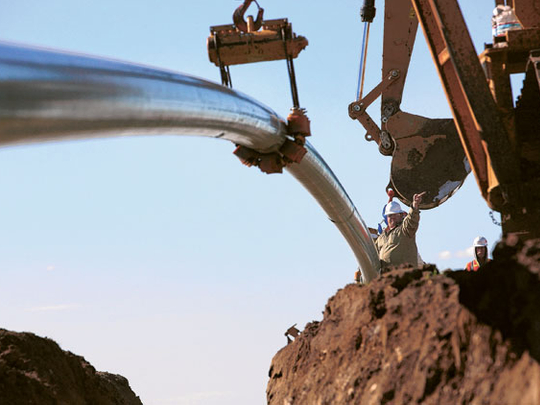
Last week I discussed in this column the flashpoint that is evolving in the East Mediterranean due to the tussle for discovered and yet-to-be-discovered natural gas resources.
There is no doubt that this battle will be fierce because all the countries involved — except Syria — are poor in hydrocarbon resources. But before I go into individual countries, one must ask the question of what is the ultimate size of the resource in the Levant Basin which extends from the borders of Gaza to the southern borders of Turkey?
To answer this question we have nothing to go by except the US Geological Survey, which released — coincidentally or not — in March its first assessment of the zone, estimating that it contained 1.7 billion barrels of oil and 122 trillion cubic feet (TCF) of gas.
Even if all these quantities are recoverable, the oil is not even one per cent that of Saudi Arabia and only 14 per cent of Algeria's, the country with the least reserves in Opec.
As for gas, the resource is about 14 per cent that of Qatar's, and Algeria alone contains 159 TCF of proved reserves. Therefore, there will be no "Qatar" in the East Mediterranean as someone suggested to me few weeks ago.
Yet the resource is huge for the parties involved. Lebanon imports 96 per cent of its energy needs of about 150,000 barrels a day, mostly fuel oil and diesel for power generation. Therefore, 500 million cubic feet (MCF) a day will cancel two-thirds of its oil imports, provided the gas network is established, a project that is in the government plans.
Turkish programme
Turkey imports 90 per cent of its energy requirements, and its hydrocarbon resources are very little. Its gas imports alone are 3.8 billion cubic feet (BCF) a day with room for growth to substitute oil.
Its exploration programme is concentrated in the Black Sea and close to the shore in the Mediterranean. Therefore its interest in finding gas in its Exclusive Economic Zone (EEZ) cannot be understated.
The same goes for Cyprus which has no oil and gas resources and has to import oil to the tune of 2.5 million tons a year, almost half of it for power generation. Therefore any gas discovery producing 150 MCF a day will probably halve Cyprus' imports of oil.
Syria has its own oil and gas resources but actually imports gas from Egypt and would need much more from wherever it can get it. Syria still uses about six million tons of fuel oil in electricity-generation which can all be substituted by gas when available, and liquids can be exported. Therefore Syria has an immediate use for at least additional 360 MCF a day of gas.
Investment needed
Israel's consumption of natural gas has been growing since 2003, but remains a relatively small portion of its current energy mix at 11 per cent in 2008 where production was close to 132 MCF a day. However imports from Egypt raised consumption sharply by about 318 MCF a day.
There is indeed room for further increases as Israel uses close to eight million tons a year of coal and about 1.5 million tons of fuel oil for electricity-generation. Therefore conversion to natural gas not only saves the cost of imports but improves the environment.
If so, Israel would require an additional 800 MCF a day of natural gas which happens to be less than the expected production from Tamar gas field scheduled for 2013 at 1,000 MCF a day. The Leviathan is not expected to come on stream before 2017 and Israel is already considering options of storage in the depleted Noa field and export through a new liquefaction in Cyprus or by using Egypt's facilities.
Needless to say that this whole Israeli dream needs a lot of investment for field and infrastructural development to become a reality. A report for the US congress shamelessly suggests that Israel should continue to import the lowly priced Egyptian gas and "begin exports, most likely to Europe or Jordan, [to] further improve Israel's energy and economic security."
Accord with Cyprus
But the Egyptians are already working on new pricing structure if exports are to continue. It is however surprising that Egypt is absent from these developments. The northern Sinai EEZ extends so far that an agreement with at least Cyprus is in order.
There is no doubt that Israel is well ahead of everybody else in developing the gas resources of the Levant. It is for other countries to expedite exploration in their own waters first and then in their EEZs. The situation is complicated by the fact that the EEZs are overlapping which would require countries to agree jointly on their delineation as bilateral agreements may not be adequate.
The writer is former head of Energy Studies Department in Opec Secretariat in Vienna.












